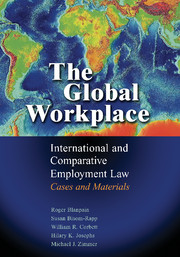Book contents
- Frontmatter
- Contents
- Acknowledgments
- Table of Cases
- Table of Statutes
- Table of Secondary Authorities
- 1 The Study of International and Comparative Employment Law
- 2 The International Labour Organization and International Labor Standards
- 3 The United States
- 4 Canada
- 5 Mexico
- 6 The Regulatory Approach of the North American Free Trade Agreement
- 7 The European Union
- 8 The United Kingdom
- 9 Germany
- 10 France
- 11 China
- 12 Japan
- 13 India
- 14 Pursuing International Labor Standards in U.S. Courts and Through Global Codes of Conduct
- Index
10 - France
Published online by Cambridge University Press: 05 June 2012
- Frontmatter
- Contents
- Acknowledgments
- Table of Cases
- Table of Statutes
- Table of Secondary Authorities
- 1 The Study of International and Comparative Employment Law
- 2 The International Labour Organization and International Labor Standards
- 3 The United States
- 4 Canada
- 5 Mexico
- 6 The Regulatory Approach of the North American Free Trade Agreement
- 7 The European Union
- 8 The United Kingdom
- 9 Germany
- 10 France
- 11 China
- 12 Japan
- 13 India
- 14 Pursuing International Labor Standards in U.S. Courts and Through Global Codes of Conduct
- Index
Summary
At the end of the century during which labor law has developed and at the dawn of a new one, it appears difficult for western European countries to develop optimistic views about the evolution of employment rights and social protection. In this sense, fears about the future are underpinned by a glorified past and a troubled present.
…. Another phenomenon is the ever-invading process of market logic. The market tends to become the only logic by which any exchange of goods is carried out or any service is provided. Under this trend competition law becomes the prominent discipline and any element that could disrupt the functioning of the market is considered harmful. In this approach, which is greatly influenced by neo-liberal ideology, labor law is considered as having a disruptive effect on the market. In France, this conception damages the idea that some services, being of general interest … justify restrictions of competition and cannot be organized on pure market logic.
Christophe Vigneau, Labor Law Between Changes and Continuity, 25 Comp. Lab. L. & Pol'y J. 129, 129 & 133 (2003).INTRODUCTION
The French Constitution, the basis of the Fifth Republic, was approved by the populace and promulgated in 1958. The Parliament does not have the predominant role in the government that it occupied in the Constitution of the Fourth Republic. In former regimes, the Parliament had the power to determine law. Section 34 of the Constitution lists the areas in which the Parliament can legislate.
- Type
- Chapter
- Information
- The Global WorkplaceInternational and Comparative Employment Law - Cases and Materials, pp. 432 - 461Publisher: Cambridge University PressPrint publication year: 2007

